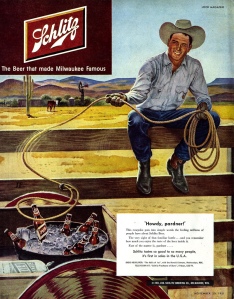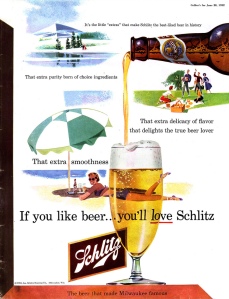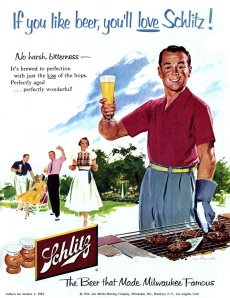Schlitz, aka “The Beer That Made Milwaukee Famous” — once the world’s best-selling brew — is making a surprisingly welcomed return thanks to Pabst Brewing Co.
After decades of being the world’s best selling beer, Schlitz’s reign came to an abrupt end in the late 1970’s-early 80’s. Ultimately, Schlitz’s downfall can be contributed to faulty recipe alterations and a failure to conduct proper damage control.
Poor quality control of barley, which caused the beer to go flat quickly, amplified the problem. To fix the flat problem, Schlitz brewers added a seaweed extract to give the beer some foam and fizz. After sitting on the shelf for three or four months, the extract turned into a solid, meaning drinkers got mouthfuls of “floaters.”
For Schlitz, flatness and floaters spelled recipe for disaster.
Instead of pulling the product off the shelves and apologizing to loyal consumers, the company decided to weather the storm and sell the bad product. And by 1981 the Schlitz brewery closed. The owners sold the brand to the Stroh Brewery Co. in Detroit in 1982, which eventually sold some of its lines to Pabst.
Pabst reissued the beer [with “real gusto”] in its original brown bottles in June using notes and interviews with former brew masters to recreate the “classic 1960s formula.” Currently, Schlitz can be found in its home town of Milwaukee as well as a few select cities.
In Milwaukee, the comeback is creating a HUGE buzz. Stores are depleted of their stock within days, with some taking names for waiting lists and being forced to limit customers to just a few six or 12 packs each.
Lucky for Schlitz enthusiasts, the beer is to be released in keg form in mid-August — just on time for an event being hosted by the Milwaukee Museum of Beer & Brewing. The event will take place on August 18th at the old Brown Bottle, now Libiamo Restaurant. The Brown Bottle, the old Schlitz brewery’s tavern, is now 70 years old.
The event agenda consists of a happy hour and a display of brewing memorabilia, a talk by museum president Jim Haertel, and a presentation by Schlitz historian Leonard Jurgensen with a Q&A session.
A look at the history of Schlitz beer:
1849: German immigrant August Krug opens a small restaurant and tavern in Milwaukee, begins to brew beer and turns it into a brewery.
1850: Joseph A. Schlitz, 20, immigrates from Germany and works for Krug as a bookkeeper.
1856: Krug dies, leaving no offspring, and Schlitz takes over management of the brewery.
1858: Schlitz marries Krug’s widow, Ann Marie.
1861: The brewery is renamed the Joseph Schlitz Brewery. Schlitz runs it with Krug’s four nephews, the Uihlein brothers.
1871: The Great Chicago Fire destroys many of that city’s breweries, giving Schlitz an opening to expand his business.
1875: Schlitz travels to Germany and is presumed dead when his ship sinks in a storm. Since he had no children with Krug’s widow, the Uihlein brothers take over the brewery.
1893: The company introduces the slogan “The Beer That Made Milwaukee Famous.”
1902: Schlitz surpasses Pabst as the world’s best-selling beer after selling 1 million barrels that year.
1912: Schlitz bottles its beer in brown bottles, marking the first time a brewer does so. The dark color prevents light from spoiling the beer.
1920: Prohibition begins. The brewery makes soda, malt syrup and candy. It survives because the Uihlein brothers have extensive real estate holdings.
1934: Prohibition ends, Schlitz resumes production and retakes No. 1 sales spot.
1953: Strike by Milwaukee brewery workers hurts brewers like Pabst, Blatz and Schlitz, which lose market share to rivals such as Anheuser-Busch Cos. Inc. of St. Louis.
1954: Schlitz briefly rebounds to again be the world’s best-selling beer.
1955: Anheuser-Busch takes over the top spot, which it still holds.
1975: Immediate family management of Schlitz ends and distant relatives and outsiders take over the operation.
Mid-to-late 1970s: Schlitz still sells well, so the new owners try to make more by shortening the fermenting process. But the beer has no foam and is flat, so managers add a seaweed extract. But that turns solid after sitting in bottles for a few months. Schlitz sales fall and the old formula is gone.
1981: Production of Schlitz ends in Milwaukee when workers strike.
1982: Detroit’s Stroh Brewery Co. acquires Schlitz and sells off many of Schlitz’s plants to pay for the acquisition. It focuses on promoting Schlitz’ secondary brand, Old Milwaukee.
1999: Pabst Brewing Co. buys Schlitz from Stroh.
2008: Schlitz reintroduces the classic formula.










Like the old saying goes: “When you’re out of Schlitz, you’re out of beer!”
Nice collection of advertisements. Wonder how long the Schlitz blitz will last.
Pingback: Holy Schlitz! - Page 2 - Home Brew Forums
I would love to buy the stuff, but for some reason they have opted (as of 10 Nov 2009) NOT to offer the beer in Oklahoma. If the wife and I want it, we have to drive to Missouri!
I would love to know who wrote the old “When your out of Schlitz, your out of beer JINGLE song. . . .I know Burt Manning was responsible for the saying, but who wrote the musical jingle??
Wesley H.
Disgruntled Oklahoman
Manning also wrote the musical jingle. Dick Marx did the arrangement.